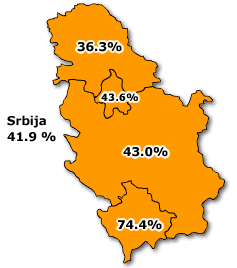I have been fairly quiet, I know, since trying to follow the returns on the constitutional referendum in Serbia this past weekend. Of course, here in the United States we are having elections as well, and they are the first ones I have been optimistic about for a long time. Here in Massachusetts, it looks certain that we will reverse the curse that has given us a series of Republican governors (three out of four of them embarrassing disasters) since 1990, electing instead the first really inspiring figure to emerge from outside of the machine in ages. The House of Representatives is pretty well certainly moving out of the hands of Bush's party, and it looks like there is at least a fighting chance of getting a majority in the Senate as well. These are midterm elections, which means that the same malicious dolt will occupy the presidency for another two years, but he will be considerably weakened in his ability to take revenge on the country that despises him and is about to hand him a large-scale repudiation.
As a part the anticipatory celebration, and thanks to Jane at the blog Jezero vatrenog kera (or is that Jezero kera koji je dobio otkaz?), Lou Reed has a gift for us: the anti-Iraq war remix of Walk on the wild side.
2006-11-03
2006-11-01
2006-10-29
Constimatution
Both RIK and CeSID are projecting that the final result will show that the referendum has succeeded, based on their random samples of returns. Meanwhile, RIK claims that there were no major irregularities. CeSID claims otherwise, and the pro-boycott party LDP has been collecting evidence of irregularities, one piece of which was posted by Viktor Marković. More detail at Bojkot.
50%, ipak

CeSID is now estimating that turnout was 50% one hour before the official poll closing time. If the competing figures follow the pattern set so far, RIK's numbers will be higher. For the referendum to pass, a majority of registered voters must have voted yes, which means that the overwhelming majority of votes will have to be in favor.
Image: Turnout at 7 PM, according to CeSID.
Update: B92 is reporting (only by audio now, no text to link) that CeSID's estimate is that the referendum has succeeded, based an analysis of a random sample of polling places.
Marginally related to referendum; more important news
One of the nice things about following ongoing news is the possibility of a surprise. Today I have had B92 running all day, and since today is Sunday that means listening to one of my favorite music programs on the planet, Žikica Simić's Dole na uglu. Today he is featuring the work of an artist I have never heard of before, Howe Gelb. This is wonderful stuff! Apparently he is playing a concert in Belgrade next week, at Dom omladine. Lucky Belgrade.
Referendifying

As the second day of the referendum on the constitution continues, CeSID is reporting turnout at 33.1% at 2 PM. The comparative figures may be more interesting, since they show the highest turnout in Kosovo (unsurprisingly, since the huge gap between the number of residents and the number of registered voters generally produces distorted election results) and in Belgrade (also unsurprisingly, since the proposed text continues the centralization of resources and political power in Belgrade). Unless there is unusually high turnout in the last hours of the afternoon and early evening, this makes it look likely that turnout will not reach the 50% + 1 threshold. If this turns out to be the case, it might be understood as supporting the following theses:
1. Serbia does indeed new a new constitution, but citizens are not so excited about about approving one that was prepared in a hurry and without a wide-ranging process of consultation.What happens in the event that the referendum does fail? First, this probably means that the government fails as well, which would force the calling of new elections. But this only changes the situation marginally, since the plan was for elections to be called anyway, probably in December. Second, the process of generating a new constitution has to continue. Law professor and former high judge Zoran Ivošević sees two ways in which this can be done: either renewed voting on the same text, or the calling of a constitutional convention. The second option is probably more promising than the first.
2. There is resistance to proposals which do not involve some decentralization of power.
3. The effort to cast a political question as a question of patriotism (with the famous clause on Kosovo) has not succeeded, and it is possible that the currency of patriotism has been overdrawn.
4. Types of consultation matter; some of the anti-referendum sentiment may derive from the fact that the text was designed to satisfy the leaders of the major political parties, not the citizens.
Views: Estavisti favors the referendum, read his reasons why. Serbian Mess does not, and also has reasons.
Image: Turnout by region at 5 PM on Sunday, according to CeSID.
Update: The Republic Electoral Commission (RIK) has bigger numbers than CeSID. They estimate that turnout at 6 PM is over 47%, and also announced that they have decided (suddenly?) that rather than closing polling places at 8 PM as planned, they would keep them open as long there are people near them. Meanwhile, CeSID is beginning to give information about irregularities in voting. Could a last-minute change in the rules turn out to be one of them?
Subscribe to:
Comments (Atom)